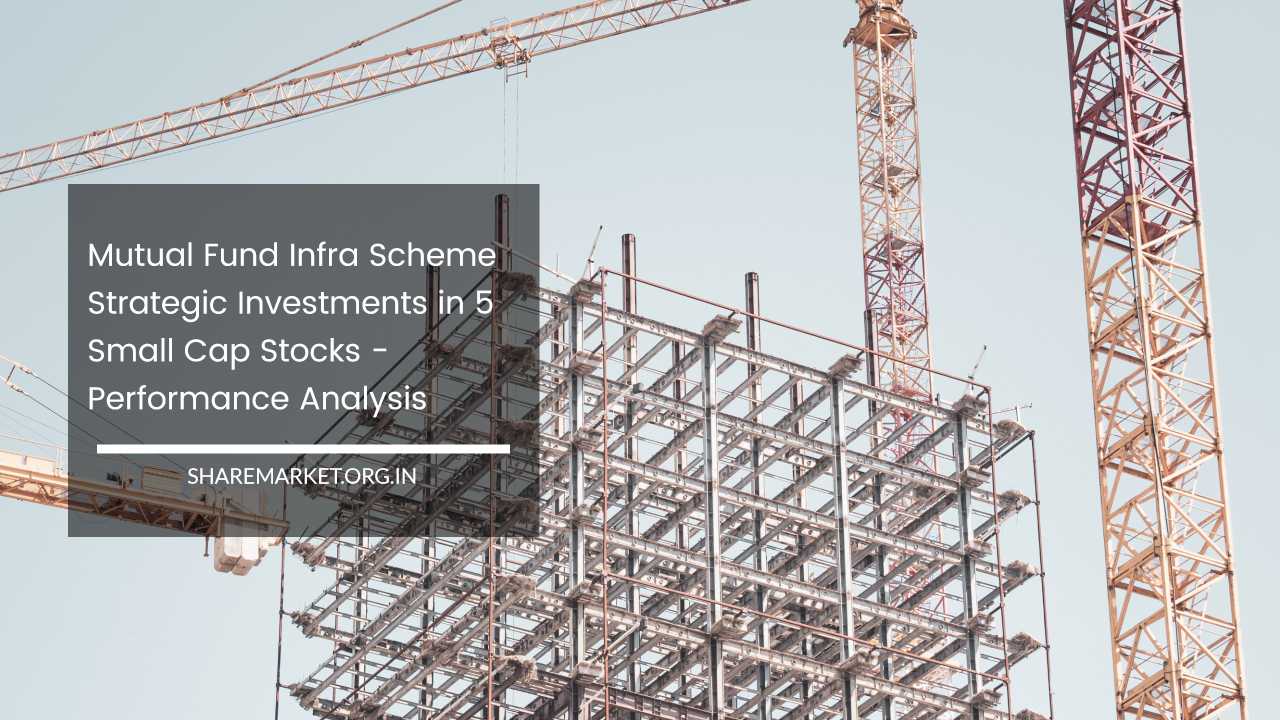Mutual Fund Infra Scheme Strategic Investments in 5 Small Cap Stocks – Performance Analysis

Small Cap Stocks
Unlocking the Potential: Mutual Fund Infra Schemes’ Strategic Investments in Small Cap Stocks – Performance Analysis
In recent years, the investment landscape in India has witnessed a significant surge in the infrastructure sector.
Mutual funds, always on the lookout for promising investment opportunities, have not been far behind.
They have strategically invested in various companies, particularly in the small-cap space, to harness the potential growth in this sector.
This article dives deep into the realm of mutual fund infrastructure schemes and their strategic investments in five notable small-cap stocks.
We will also analyze the performance of these stocks, shedding light on how they have fared in recent years.
The Infrastructure Boom in India
Before delving into the specifics of the stocks, it’s crucial to understand the broader context of the infrastructure sector in India.
Over the last decade, the Indian government has placed a considerable emphasis on infrastructure development.
This focus has stemmed from the recognition that robust infrastructure is essential for economic growth and overall development.
Infrastructure projects encompass a wide range of sectors, including transportation (roads, railways, airports), energy (power generation, distribution), real estate, logistics, and more.
To facilitate investment in these areas, mutual fund companies have created dedicated infrastructure schemes.
These schemes pool funds from various investors and strategically allocate them to companies operating in the infrastructure sector.
Infrastructure Schemes: The Engine Behind Growth
Infrastructure schemes offered by mutual funds have gained popularity among investors seeking exposure to the growth potential of this sector.
These schemes are managed by experienced fund managers who conduct thorough research and analysis before investing in companies.
Over the last three years, infrastructure schemes have delivered an impressive average return of 35 percent. This stellar performance can be attributed to multiple factors, with the government’s unwavering commitment to infrastructure development taking center stage.
The government’s push for projects such as the Bharatmala Pariyojana (a highway development initiative), Sagarmala (a port-led development program), and the Smart Cities Mission has spurred growth and investment opportunities in the infrastructure sector.
Additionally, as the government has sought to increase private sector participation in infrastructure projects, companies in this sector have experienced a boost in investor confidence.
This strategic shift towards privatization has opened up exciting prospects for businesses, and mutual fund schemes have taken notice.
As of now, there are a total of 21 infrastructure schemes offered by various mutual fund companies. These schemes cater to a diverse range of infrastructure-related companies, spanning across sectors such as ports, power plants, real estate, logistics, and more.
The Spotlight on Small Cap Stocks
Intriguingly, mutual fund infrastructure schemes have shown a particular interest in small-cap stocks within the infrastructure sector. Small-cap stocks are typically those with a market capitalization between Rs 300 crore and Rs 2,000 crore.
These companies often possess substantial growth potential, but they are also associated with higher risks due to their smaller size and lower liquidity compared to large-cap stocks.
Despite the inherent risks, small-cap stocks have become a focal point for mutual fund infrastructure schemes due to their potential for exponential growth.
Let’s take a closer look at five such small-cap companies that have captured the attention of these schemes:
1. KNR Constructions
Sector: Construction
KNR Constructions has been a standout player in the construction sector, attracting investments from seven infrastructure schemes managed by mutual funds.
Over the past three years, the company’s stock has exhibited remarkable performance, doubling investors’ capital.
On September 11, 2020, the stock was trading at Rs 124, and as of September 14, 2023, it had reached a closing price of Rs 275. However, it’s worth noting that its returns in the shorter term, such as the last six months or one year, have been below average.
This impressive performance is in line with the broader trend observed in infrastructure schemes offered by mutual funds, which have delivered an average return of 35 percent over the last three years.
The increased focus of the government on infrastructure development has significantly contributed to the success of companies operating in this sector.
2. PNC Infratech
Sector: Construction
PNC Infratech is another construction sector company that has captured the attention of 11 infrastructure schemes managed by mutual funds. Its stock, which was priced at Rs 157 on September 11, 2020, closed at Rs 362 on September 14, 2023, effectively doubling investors’ money over three years.
Furthermore, the stock has provided a 25 percent return in the last six months, with expectations of increased infrastructure investment ahead of the upcoming Lok Sabha elections.
3. GR Infraprojects
Sector: Construction
GR Infraprojects is yet another construction sector player, having received investments from eight infrastructure schemes.
While it delivered approximately 14 percent returns over the last six months, it’s important to note that its performance since its IPO in July 2021 has been lackluster, with the stock closing at Rs 1,215 on September 14, 2023.
4. KEI Industries
Sector: Industrial Products
KEI Industries, a manufacturer of industrial products, has attracted investments from seven infrastructure scheme portfolios.
Remarkably, the stock has provided substantial returns to investors in the last three years, with its price rising from Rs 359 on September 11, 2020, to a closing price of Rs 2,621 on September 14, 2023, marking a significant 64 percent increase in the last six months.
5. MTAR Technologies
Sector: Aerospace and Defense
MTAR Technologies is unique in its focus on manufacturing products related to aerospace and defense, and it has even played a vital role in the Chandrayaan-3 mission.
This company’s potential has not gone unnoticed, with seven mutual fund infrastructure schemes investing in its stock.
Since its listing in March 2021, it has delivered a remarkable 161 percent return, with the stock closing at Rs 2,665 on September 14, 2023, and rising by 63 percent in the last six months.
Analyzing the Performance of Small-Cap Stocks
The performance of these small-cap stocks within the infrastructure sector has been nothing short of remarkable. However, it’s essential to delve deeper into each company’s performance and the factors driving their growth.
KNR Constructions: As previously mentioned, KNR Constructions has doubled investors’ money over the last three years. This remarkable growth can be attributed to several factors.
First and foremost, the government’s sustained commitment to infrastructure development has translated into a consistent flow of contracts for construction companies like KNR. As a result, their order books have expanded, providing revenue visibility.
Additionally, KNR Constructions has a history of delivering projects on time, which enhances its reputation and ability to secure new contracts.
However, it’s important to note that the company’s returns in the last six months or one year have been below normal.
This could be due to various factors, including market sentiment, changes in project timelines, or broader economic conditions. Investors should consider these factors when assessing the short-term prospects of the stock.
PNC Infratech: PNC Infratech’s stock has exhibited robust growth over the past three years, effectively doubling investors’ capital.
The company’s performance is closely tied to its ability to secure and execute infrastructure projects successfully.
With the government’s renewed focus on infrastructure development, companies like PNC Infratech are well-positioned to benefit from a surge in new projects.
The stock’s 25 percent return in the last six months is indicative of the market’s optimism about increased infrastructure spending in the lead-up to the Lok Sabha elections.
Governments often prioritize infrastructure development in the run-up to elections, and this bodes well for companies in the sector.
GR Infraprojects: While GR Infraprojects has delivered a reasonable return of approximately 14 percent in the last six months, its performance since its IPO has been less impressive. It’s essential to understand the factors contributing to this mixed performance.
The post-IPO performance of companies can be influenced by various factors, including market sentiment, the company’s ability to meet growth expectations, and broader economic conditions.
In GR Infraprojects’ case, it’s possible that the market had overly optimistic expectations following its IPO, leading to a subsequent correction in the stock price.
Investors should carefully assess the company’s fundamentals, project pipeline, and execution capabilities to gauge its future prospects.
KEI Industries: KEI Industries stands out with its exceptional performance, delivering a significant 64 percent return in the last six months.
This growth can be attributed to several factors, including the company’s strong market position, diversified product portfolio, and exposure to sectors with high growth potential, such as power and infrastructure.
Additionally, the government’s focus on electrification projects and the expansion of power infrastructure has likely contributed to KEI Industries’ success.
The company’s ability to capitalize on these opportunities and maintain a competitive edge in the market has been key to its impressive performance.
MTAR Technologies: MTAR Technologies is a unique player in the aerospace and defense sector, known for its precision engineering capabilities.
Its stock has witnessed remarkable growth since its listing in March 2021, with a 161 percent return. This exceptional performance can be attributed to several factors.
Firstly, MTAR Technologies’ specialization in critical components for aerospace and defense applications positions it as a niche player with limited competition.
Furthermore, its involvement in high-profile projects, such as the Chandrayaan-3 mission, has garnered attention and boosted investor confidence.
Additionally, the government’s focus on indigenous defense manufacturing, as evidenced by initiatives like “Make in India” and “Atmanirbhar Bharat,” has created a favorable environment for companies like MTAR Technologies.
The company’s ability to secure contracts and deliver on its commitments has played a pivotal role in its stellar performance.
Factors Influencing Small-Cap Stock Performance
Several common factors contribute to the impressive performance of these small-cap stocks within the infrastructure sector:
- Government Support: The government’s commitment to infrastructure development through various initiatives has provided a strong tailwind for companies in this sector. Infrastructure projects offer significant growth opportunities for construction, logistics, and related industries.
- Order Book Expansion: Successful companies in the infrastructure sector often have a robust order book, indicating a steady flow of projects. A growing order book provides revenue visibility and ensures a consistent source of income.
- Timely Execution: Companies that consistently deliver projects on time and within budget gain the trust of clients and investors. Timely execution enhances a company’s reputation and leads to repeat business.
- Market Sentiment: Short-term stock performance can be influenced by market sentiment, macroeconomic conditions, and investor perception. Companies with strong fundamentals are better equipped to weather market fluctuations.
- Niche Focus: Companies with a unique focus, such as MTAR Technologies in the aerospace and defense sector, can carve out a niche market for themselves with limited competition. Niche players often command higher margins.
- Economic Growth: The overall economic growth of the country plays a crucial role in the performance of infrastructure-related stocks. A growing economy generates increased demand for infrastructure development.
Investor Considerations
While the performance of these small-cap stocks within the infrastructure sector has been impressive, investors should exercise caution and consider various factors before making investment decisions. Here are some key considerations:
- Risk Tolerance: Small-cap stocks can be inherently more volatile and carry higher risks compared to large-cap stocks. Investors should assess their risk tolerance and investment horizon before allocating funds to these stocks.
- Fundamentals: Analyze the fundamentals of each company, including financial health, order book, project pipeline, and management quality. A strong foundation is essential for long-term growth.
- Diversification: Diversifying your investment portfolio across various sectors and asset classes can help mitigate risk. While small-cap stocks offer growth potential, they should be part of a well-balanced portfolio.
- Long-Term vs. Short-Term: Consider your investment horizon. While short-term price fluctuations are common, a long-term perspective can help you ride out market volatility and capture potential growth.
- Stay Informed: Keep yourself informed about developments in the infrastructure sector, government policies, and industry trends. Staying updated can help you make informed investment decisions.
Final Thoughts
The infrastructure sector in India is on an upward trajectory, driven by government support, increased private sector participation, and a growing economy.
Mutual fund infrastructure schemes have strategically invested in small-cap stocks within this sector, capitalizing on the growth potential they offer.
The performance of these small-cap stocks, including KNR Constructions, PNC Infratech, GR Infraprojects, KEI Industries, and MTAR Technologies, has been noteworthy.
While they have delivered impressive returns, it’s essential for investors to conduct thorough research, assess risk, and consider their investment goals before making investment decisions.
Investing in small-cap stocks can be rewarding, but it also carries higher risks. Therefore, a prudent and diversified approach to investing in the infrastructure sector, complemented by a long-term perspective, can help investors unlock the potential of these promising opportunities while managing risk effectively.
As the infrastructure boom in India continues, small-cap stocks in this sector remain an area of keen interest for mutual funds and individual investors alike.

















